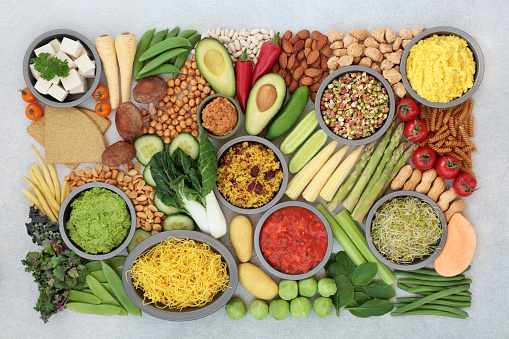Are you concerned about managing your health and weight while helping to make the environment more sustainable? With the rise of processed foods and fast-paced lifestyles. Maintaining a healthy diet can be difficult. Consider having chronic conditions and being overweight. And at the same time contributing to the destruction of the planet’s ecosystems.
This requires the cooperation of many people. Adopting a plant-based diet can help with both health and environmental issues. Keep reading to discover how switching to a plant-based diet can help you achieve excellent health and contribute to a more sustainable future.
Primarily whole food intake from plant sources has been shown Research Lose weight and lower blood pressure. and lower risk of chronic illnesses such as heart disease, cancer and diabetes. Below are the benefits of a plant-based diet that make it a safe and effective option for people of all ages.
A. Reduced risk of chronic disease
A plant-based diet It has been linked to a lower risk of chronic illnesses, including heart disease, diabetes and cancer. These diets emphasize eating whole, unprocessed plant foods such as fruits and vegetables, whole grains, legumes, nuts, and seeds. Anti-inflammatory foods help reduce inflammation in the body. which is associated with the development of chronic diseases.
Overall, a plant-based diet helps reduce the risk of chronic illness by promoting a healthy body weight, reducing inflammation, and providing the body with essential nutrients and antioxidants.
B. Weight management
A plant-based diet is helpful for weight control for several reasons. First, they have Low calorie Because they are often high in fiber and low in energy density. Second, they tend to minimize overeating Promotes feelings of fulfillment and happiness. By adding non-starchy vegetables, excellent quality protein sources and balanced meals, vegetarian diets help achieve weight control goals.
c. Improves gut health
Vegan diets contain fiber and antioxidants that improve gut health. The gut microbiome can significantly influence several areas of health, such as the immune system, metabolism and mood.
A diet rich in plant-based foods such as fruits, vegetables, legumes and whole grains supports gut health and The microbiome. The microbiome breaks down fiber, produces essential nutrients and controls inflammation. Therefore, following a plant-based diet that includes a variety of plant foods can improve gut health and overall health.
D. Better digestion
Eating fiber-rich plant foods helps with regular bowel movements and prevents constipation. Vegetarian foods are rich in fiber, vitamins, minerals and phytonutrients, which support healthy digestion.
Fiber helps move food through the digestive system. Vitamins and minerals, however, help nourish the gut lining and promote a healthy metabolism. Phytonutrients provide antioxidants for better absorption of nutrients from food.
E. Improve immune system
A plant-based diet has been shown to improve immune system health. Eating more plant-based foods boosts the body’s immune system and reduces the risk of chronic disease.
Vitamins and minerals, phytochemicals and antioxidants in plants help keep your cells healthy. They keep your body in balance so your immune system can function optimally.
The sustainability benefits of a plant-based diet
A vegetarian diet has various health benefits, but it also offers substantial sustainability benefits. By reducing the consumption of animal products, consumers can greatly reduce their carbon footprint, reduce deforestation and reduce water pollution. In this context, let’s examine the sustainability benefits of a plant-based diet.
A. Lower carbon footprint
A plant-based diet reduces the carbon footprint by reducing the greenhouse gas emissions associated with animal husbandry. Plant-based diets take fewer resources to produce and generate fewer greenhouse gases than animal agriculture.
For example, it takes 20 times more land to produce a pound of beef and 20 times more greenhouse gases than a pound of tofu. By consuming this food, people can reduce their carbon footprint and help fight climate change.
B. Reduce water use
A plant-based diet reduces water use in several ways, such as reducing the use of animal products and water pollution due to animal agriculture. It also reduces pressure on freshwater resources, which are becoming increasingly scarce in many parts of the world. A plant-based diet helps conserve freshwater resources and ensure their availability for future generations.
Practical tips for adopting a plant-based diet
A. Start with small changes
Adding small changes such as Meatless mandaPlanning your meals and trying a new plant-based recipe each week is key to adopting a plant-based diet. It’s also important to stock up on essentials like beans, whole grains, legumes, fruits and vegetables. As you identify your favorite recipes, you can add them to your meal rotation and increase the number of plant-based foods you eat.
B. Increase your intake of vegetables and fruits
To adopt a vegetarian diet, it is essential to increase your consumption of vegetables and fruits. Stocking up on fresh vegetables and incorporating them into your meals, snacks and smoothies can make the transition easier. Experiment with different foods and aim to include a range of colorful fruits and vegetables in your diet.
C. Plant-based protein instead of animal-based protein
Replacing animal-based proteins with plant-based alternatives is crucial to an effective vegetarian diet. Adding foods like legumes, nuts, seeds, tofu and tempeh to your diet can provide essential protein and help balance. test With a variety of recipes to uncover delicious and complete plant-based protein sources.
D. Plan your meals in advance
Planning meals, choosing a variety of whole foods, packing your meals and snacks, and experimenting with new recipes are essential tips for eating a plant-based diet. Meal planning helps ensure nutritious and delicious meals while choosing whole foods helps your body get all the vitamins and minerals it needs.
Packing meals and snacks helps ensure healthy and convenient options when on the go. Experimenting with new recipes can help make plant-based eating more enjoyable and keep things interesting.
Misconceptions of a plant-based diet
A. Concerns about protein intake
A common misconception about a plant-based diet is that it may provide the macronutrients the body needs, such as adequate protein. Still, a plant-based diet can meet protein needs quickly with careful planning and food selection. In fact, many are plant-based athlete And bodybuilders have successfully achieved their fitness goals while following a plant-based diet.
B. Availability and cost of plant-based foods
Another myth about a plant-based diet is that it can be more expensive and challenging than a regular diet. Plant based diet too economic and accessible. Mainly when focusing on whole foods like grains, legumes and vegetables. Prepping meals and buying in bulk can help save costs. Many grocery stores and restaurants now offer a range of plant-based choices.
c. Social challenges and pressures
A misconception about a plant-based diet is that it can be socially problematic and lead to stress. Still, many restaurants and social gatherings now offer plant-based options. There are online forums and support groups where individuals can interact and share experiences. Individual eating preferences should be respected.
Takeaway
In conclusion, a plant-based diet offers many sustainability and personal health benefits. This diet helps maintain a healthy weight, improve digestion and gut health, reduce the risk of chronic illness, and strengthen the immune system.
Furthermore, plant-based diets significantly impact sustainability by reducing greenhouse gas emissions, using less water, and conserving natural resources. Small adjustments are essential for a smooth transition to a plant-based diet, such as starting with Meatless Mondays and gradually increasing the consumption of vegetables and fruits.
It’s also important to include plant-based proteins like seeds, nuts and legumes. This diet change can be made simpler and more fun by meal planning, trying new recipes, and stocking up on essentials. People can improve their health and help ensure a more sustainable future for the planet by eating a plant-based diet.





